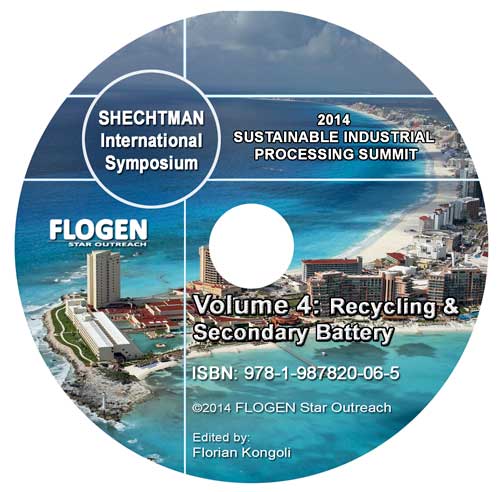2014-Sustainable Industrial Processing Summit
SIPS 2014 Volume 4: Recycling & Secondary Battery
| Editors: | Kongoli F |
| Publisher: | Flogen Star OUTREACH |
| Publication date: | 20 December 2014 |
| Pages: | 498 pages |
| ISBN: | 978-1-987820-06-5 |
| ISSN: | 2291-1227 (Metals and Materials Processing in a Clean Environment Series) |

CD shopping page
A Metal-Free Organic-Based Aqueous Flow Battery for Massive Electrical Energy Storage
Michael Aziz1;1HARVARD SCHOOL OF ENGINEERING AND APPLIED SCIENCES, Cambridge, United States;
Type of Paper: Plenary
Id Paper: 319
Topic: 12
Abstract:
The ability to store large amounts of electrical energy is of increasing importance with the growing fraction of electricity generation from intermittent renewable sources such as wind and solar. Solid-electrode batteries are drained far too soon, when discharged at full power, to economically fill the gaps in photovoltaic or wind temporal power profiles. Flow batteries show promise because the designer can independently scale the power (electrode area) and energy (arbitrarily large storage volume) components of the system by maintaining all electro-active species in fluids. Wide-scale utilization of flow batteries is limited by the abundance and cost of these materials, particularly those utilizing redox-active metals and precious metal electrocatalysts. We have developed a flow battery based on the aqueous redox chemistry of small organic molecules called quinones. The redox active materials contain no metals and can be very inexpensive. Electrochemical studies show that these molecules undergo fast and reversible two-electron two-proton reduction on carbon electrodes without the addition of electrocatalyst. At the time this abstract is being written, an aqueous flow battery involving the quinone/hydroquinone couple has achieved a peak power density exceeding 0.6 W/cm2 and has undergone over 100 deep discharge cycles with 99.986% capacity retention per cycle. The absence of active metal components in both redox chemistry and catalysis represents a significant shift away from the direction modern battery R&D has been taking. This new approach may enable massive electrical energy storage at greatly reduced cost.